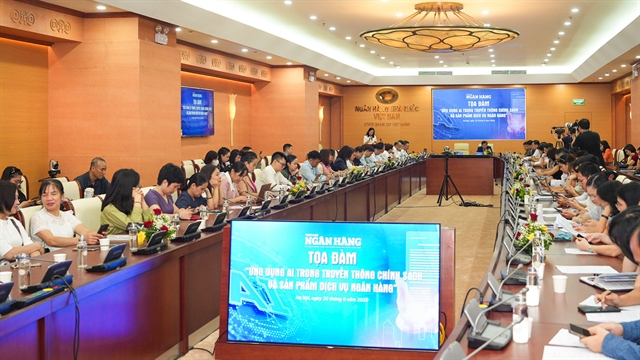The explosion of AI is opening up breakthrough opportunities for the Vietnamese banking industry, but a comprehensive strategy is needed to make AI truly become a main driver for the industry’s sustainable development.

HÀ NỘI — The rise of artificial intelligence (AI) is unlocking transformative opportunities for the Vietnamese banking sector, but experts warn that only a balanced, strategic approach that aligns technology, human resources and legal frameworks will allow AI to drive sustainable growth.
Speaking at a forum on the application of AI in the banking industry held in Hà Nội on Wednesday, Deputy Chairman and General Secretary of the Vietnam Banks Association Dr Nguyễn Quốc Hùng emphasised the global momentum behind the AI revolution and the urgency for Vietnamese banks to adapt.
“In the global context, AI is becoming a fundamental technology, having a profound impact on all fields, including finance and banking,” Hùng said. “The application of AI is not only a trend, but also an urgent requirement for the Vietnamese banking system to improve its competitiveness, provide modern services and ensure the safety and stability of national finance and currency.”
Hùng pointed to several key policy decisions from the Party and Government as critical enablers of this transition. These include Resolution 57-NQ/TW, which identifies science, technology, innovation and digital transformation as strategic breakthroughs; Decision 749/QĐ-TTg, which approves the National Digital Transformation Programme with banking listed as a priority sector; Decision 67/QĐ-NHNN on digital transformation in banking; and Decree 94/2025/NĐ-CP, which introduces a regulatory sandbox to allow banks and fintech companies to safely test emerging technologies such as AI.
According to Hùng, these decisions create a solid foundation for the sector to develop in line with global trends.
“The guidelines and policies are a solid foundation and a strategic orientation to pave the way for breakthrough development of the country’s banking industry. They are a legal corridor for credit institutions to apply AI safely and under control. Under the process, the banking industry does not only apply technology passively, but also create a new future where technology and finance blend together and effectively serve the development of the country,” he said.
Research indicates that by 2025, approximately 45 per cent of sales in the finance and banking sector will be conducted entirely via digital platforms, with no need for traditional transaction points. This marks a deep shift in how banks operate and engage customers, driven largely by the adoption of AI to analyse data, automate processes and personalise services.
“In Việt Nam, a series of commercial banks have been implementing AI solutions to improve customer service efficiency. In particular, ‘virtual assistants’, which use natural language processing technology, are becoming a popular trend, helping users communicate, ask questions and make transactions right on banking applications without having to go to the bank counter,” Hùng said.
However, he cautioned that technological advancement comes with its own set of risks.
“Along with the opportunities, challenges in cybersecurity, data security, the risk of deepfake and AI ethical risks are tangible barriers.”
One critical issue is the need for high-quality, secure data. Inaccurate, unstructured or poorly protected data can not only hinder AI performance but also result in significant breaches of trust, potentially destabilising individual institutions or even the wider system. Hùng noted that to truly unlock AI’s potential, banks must make serious investments in modern, secure IT infrastructure capable of supporting complex applications.
To ensure AI supports the sector's long-term development, Hùng called for a comprehensive strategy that aligns technological advancement with skilled human resources and strong legal oversight. He stressed the need for coordination among all players in the financial-technology ecosystem to foster innovation in a controlled, responsible manner.
Hùng also advocated for prioritising ethics in AI deployment. He proposed developing and adhering to ethical principles that ensure AI applications are fair, transparent and centred on serving people. He further suggested that relevant authorities consider forming an internal AI Ethics Council to supervise major projects and ensure they align with national values and legal standards.
Additionally, Hùng said the Government should promote collaboration between banks, fintech companies, research institutions and regulators. This would allow for the sharing of experience, data and the joint development of AI solutions that are both safe and effective.
Investment in skilled personnel must also be prioritised.
“The Government should build specific policies to attract and retain experts in AI, data science and cybersecurity,” he said.
Deputy Director of the Banking Academy of Vietnam’s Bank Research Institute, Associate Professor, Dr Nguyễn Mạnh Hùng echoed these concerns, highlighting the emerging demand for new types of jobs within the banking sector. He noted that the Fourth Industrial Revolution has brought about roles such as data scientists, AI/ML engineers, cybersecurity specialists, blockchain developers and digital banking professionals.
“Việt Nam is lacking in human resources with deep expertise in IT. According to data from the Ministry of Information and Communications, the country needs an addition of at least 400,000 technology workers from now until 2026,” he said.
To bridge this gap, Hùng argued that a synchronised effort involving the Government, educational institutions and banks is essential.
“In this process, the State will play the role of conductor to build national strategies, perfect the legal framework and invest in education. Educational institutions will play the role of architects to update programmes, establish labs and promote cooperation. Meanwhile, banks will play the role of trainers to build a culture of lifelong learning, retrain and upgrade skills, and place training orders,” he said. — VNS
- Tags
- banking





